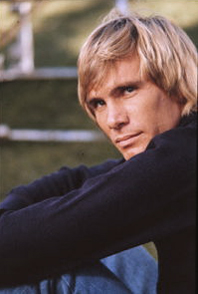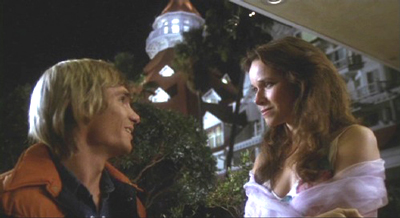
 |
|
|
|
A genuine cult film even though it received wide distribution in 1979, Richard Rush's The Stunt Man is the kind of picture that a frustrated filmmaker will spend half a career trying to get before the cameras. The interesting Rush enjoyed a couple of hits but not long before this show was known mostly as an A.I.P.- level exploitation director. Always trying to maintain his independence, Rush got a boost in 1970 as the director of the now-dated college comedy Getting Straight. But commercial success didn't make putting together projects less difficult. The Stunt Man stands alone in his filmography, an ambitious breakout hit that in any reasonable creative climate would have led immediately to more exciting projects. 
A frenetic Hollywood backstage thriller, The Stunt Man toys with the notion of the movies as a fantasy playground, where real people lead exciting, irresponsible lives outside society's rules. The filmmakers put up false fronts for the public, the local authorities and each other, play-acting to confuse outsiders. Athletic ex- Vietnam vet and wanted fugitive Cameron (Steve Railsback) stumbles onto a WW1 movie being made on location. When the film's stuntman is killed in a car crash the imperious, aloof director Eli Cross (Peter O'Toole) uses Cameron in a ruse to convince the local police chief (Alex Rocco) that nobody was harmed. Offered the job to replace the lost stunt man, Cameron is excited by the money and thrilled to meet the film's sexy star Nina Franklin (Barbara Hershey). But he also feels uneasy about the manipulative director Eli, who could turn him in to the cops at any time. Eli may have killed the previous stuntman, and might be setting up Cameron for a similar fate -- all to be recorded on film for his movie. The most boring theme in movies is the big 'fantasy vs. reality' ploy, that asks us whether we can believe what we see before our eyes. Alfred Hitchcock and Fritz Lang were playing that game back in the 1930s, but plenty of post-60s directors adopted this artsy ploy as a way of making a shallow film seem profound. The Stunt Man reinvigorates the idea with snappy camerawork, a fast pace and a good sense of humor. The slightly desperate Cameron is (figuratively and literally) seduced by moviemaking and finds that he can't tell what's real and what's not real on Eli's set. The script by Lawrence B. Marcus (Petulia) plays with puzzle pieces from the beginning. Cameron is a war veteran but is fooled by the special effects of a war film that give soldiers very realistic wounds. Convinced all along that he's going to die, he survives a ridiculously dangerous stunt scene dodging bullets and bayonets on the roof of a hotel. The other stuntmen act as if he was never in danger. But Cameron fears his tradeoff of secrets with Eli Cross -- Eli has a hold on Cameron with the law, and behaves as if he's willing to kill the fugitive on a whim. A stunt could go wrong at any time, and the cast and crew seem ready to back up any story Eli tells. The screenplay applies one more level of interlocking irony. Dazzled when the makeup & hair artist (Sharon Farrell) hops into the sack with him, Cameron is foolish enough to believe that the seductive Nina Franklin is now his steady girlfriend. This is a big emotional issue for Cameron, and the plan that he and Nina will together escape from the clutches of the devilish Eli is what keeps him on the job through the last, potentially deadly stunt. Anyone familiar with the many versions of Stevenson's The Suicide Club is bound to be disturbed by this development, as Cameron seems born to play the cinematic patsy. The Stunt Man is a good balancing act. In 1979 its fast pace and adroit cutting impressed the stratum of film fans likely to be intrigued by the surfeit of creativity in another 'small' movie with big ambitions, Terry Gilliam's Time Bandits. The film's behind-the-scenes view of filmmaking is pure fantasy. Entire complicated sequences are filmed in one go, often with no cameras visible. The action set pieces in the movie we're watching are ultra-precise action montages involving dozens of camera angles. A second unit could easily have spent a week on the action atop the hotel. The movie pretends to have a realistic basis but happily abandons it whenever the cameras roll. Even if these hyped scenes are supposed to represent Cameron's disoriented, panicked Point of View, no movie would be shot this way. But it doesn't matter -- audiences have never rejected stylization of this kind. The real process of filming a movie is usually very boring. The performances are good where they count. Peter O'Toole shines as Eli Cross, radiating gravity and believability with his every appearance. The script makes Eli into a cagey games player and confidence man, the sort of Alpha Male swine everyone is happy to serve, just to hear what his next witticism will be. The conception of Eli Cross also nails the '70s notion of the Director as God, the creative genius responsible for everything we like in the movies. When he's not floating in from the sky on a crane to intrude on private conversations (a Deux ex machina?), Eli is saying lines that make the allusion explicit: "If God could do what we can do, he'd be a happy man." This dialogue as well as the film's poster suggest that Eli is really more like the Devil, tempting Cameron with illusions of filmic glamour. 
The next best actor in the show is Allen Garfield, then in the middle of a patch where he billed himself as Allen Goorwitz, his birth name (I hope the I.R.S. was fooled). Garfield's writer Sam sets up Eli's best speeches and defends the idea that Eli's movie is a meaningful anti-war film. Also having bounced back from an ill-chosen name change, Barbara Hershey is properly reckless as the sleep-around star Nina Franklin. Nina doesn't say much at the dinner table but seems to be living her crazy life to the hilt. Steve Railsback garnered plenty of attention with his almost scary brand of wild-eyed enthusiasm. He and James Woods began together in Elia Kazan's The Visitors, a pairing that conjures up a battle of the Weirds. Cameron is an almost normal role for Railsback after his dead-on impersonation of Charlie Manson in the chilling TV movie Helter Skelter. Never accepted as a standard leading man, Railsback is a nice fit for The Stunt Man. Richard Rush's magic touch falters for only once scene, a real stinker in which Cameron and Nina play a love scene covered with paint down in a garage used by the special effects crew. The script examines the notion of the director as manipulator. Eli Cross keeps everybody around him off balance and anxious, for the supposed betterment of the movie he's making. When not pulling the wool over Cameron's eyes, Eli double- "Crosses" other members of his crew as well. We've all heard stories about directors twisting a little kid's arm to get a tearful reaction, or firing guns on the set in search of a "real" moment; I remember Steven Spielberg eliciting a wondrous reaction from a child actor by having a makeup man dress in an animal costume to create a surprise when the kid opened a door. Eli gets an emotional response and puts Nina in her place by telling her that her parents have inadvertently seen dailies of one of her sleazy nude scenes. The stagehands pivot a set wall into place behind Nina, and "voila", Eli's got an authentic anguished close-up of a distraught woman, with a background of Nazi paraphernalia. Students of on-set psychology know that insecure film people go through all kinds of self-delusional and manipulative strategies in the search for "movie magic". 1 The Stunt Man plays as if Richard Rush knew that he may never again get the chance to show what he can do. The real tribute to the director is that his show is consistently exciting and entertaining even though every scene piles on new plot holes and illogical events. Some of these can be excused by the subjective stylization: performing before the cameras, Cameron is genuinely surprised by every event in a complicated series of stunts that he's already rehearsed. 2 Other non-sequiturs of logic are "explained" by the goofy way that the movie filming is presented -- we've already decided that the show is not attempting even a normal measure of realism. Even small scenes are "movie optimized". A simple example is the paint cans on the shelf that Cameron pulls down on himself. They've all been left open, and full, ready and primed for a Three Stooges-like slapstick gag. That's to be expected, but the whole story hinges on illogical events. Cameron replaces a stuntman trapped and drowned in a car at the bottom of the river. The crew apparently recovers and repairs the car so it can be filmed again. Where's the body? Is nobody concerned that the police chief will find it? How about the stuntman's family or friends, won't they be curious to know what happened to him? We see that Eli got great footage of the car plummeting off the bridge the first time. Why does he need to shoot it again? 
This overall disconnect of course makes director Rush's little observations based on real on-set occurrences all the funnier. A crew gag interrupts a serious shot of a corpse's hand, and Eli and his crew share a minute of self-congratulatory bonding. Only after thirty seconds' waste of expensive film does an assistant ask if Eli wants the camera to "cut". I've seen that exact thing happen when a pissed-off camera crew is disgusted with their director. The Stunt Man is a smart-alecky movie fantasy, but it expresses its main theme very effectively: movie production is a realm where wildness and insanity are sometimes encouraged. Severin Films' Blu-ray of The Stunt Man gives us a good HD encoding of Richard Rush's career highlight feature, with an exhaustive stack of extras. Everybody who worked on this movie wants to continue to be associated with it. The feature commentary includes the director and all of the main actors. Severin has put together a quartet of new interview-based featurettes with O'Toole, Steve Railsback and Barbara Hershey, and a hefty docu on Rush's career. The director and two of his stars greet a re-premiere audience at the New Beverly theater. Three trailers and two deleted scenes are present, including an edgy scene at a police station where Eli & Co. spring their star from jail by staging what amounts to an elaborate gay/straight/bi kissing exhibition. You kind of want to cut away to Jack Buchanan in The Band Wagon: "It's all a bit too much, isn't it?" Severin also retains Richard Rush's wild, two hour self- produced and directed docu / confession / rant The Sinister Saga of the Making of The Stunt Man. At first playing as an egotistical vanity production, the overdirected docu spends plenty of time raking the heap of critical praise given The Stunt Man, quoting scores of big critics. But when Rush reaches the latter chapters of his story, explaining the nature of distributor bias against indie product, we realize that he is being very candid about a demeaning process that would defeat any man. Rush came from a time when a filmmaker could count on the greed of the industry -- give them a movie that will make money and you've won. Even by 1979 thing have changed. Although he has made an exciting film with plenty of commercial potential, Hollywood is intent on freezing him out -- a movie will only get distributed if the right people will make all the money. The Stunt Man was a few years too early to hook up with independent-major distributors like the Weinsteins. Rush is an experienced dog in the movie game and he seems to have fought the good fight.
On a scale of Excellent, Good, Fair, and Poor,
The Stunt Man Blu-ray rates:
Footnotes:
1. Eli behaves in a self-important manner, but he's also a charismatic crew leader -- he inspires loyalty. What's pathetic is when one is working a small show, for small stakes, with a director with an outsized ego and no status. I've had more than one director who thought that behaving like an imperious and abusive Eli Cross equals being important.
2. At one point on the rooftop Cameron balks and is urged to continue with the stunt. This confirms that he's performing rehearsed actions. But he's also experiencing them for the first time, it seems, and is genuinely shocked at every crazy event, like falling through a skylight into a brothel teeming with naked prostitutes. Such is the nature of movie-struck fantasy.
Reviews on the Savant main site have additional credits information and are often updated and annotated with reader input and graphics. Also, don't forget the 2010 Savant Wish List. T'was Ever Thus.
Review Staff | About DVD Talk | Newsletter Subscribe | Join DVD Talk Forum |
| ||||||||||||||||||